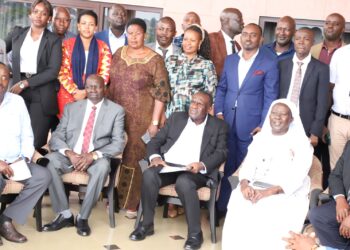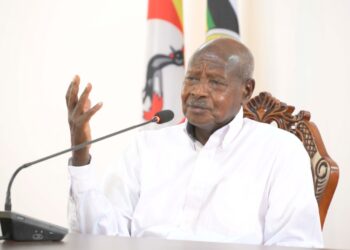By Nimi Princewill
Patricia Scotland QC, the first female Secretary-General of the Commonwealth of Nations has reignited the Commonwealth’s aspiration of improving the justice systems of its 53 member countries.
In edited audio excerpts from an interview with Nimi Princewill, Ms. Scotland discussed the outcomes of the recently concluded Commonwealth Law Ministers’ Meeting (CLMM) where Law Ministers and Attorneys-General from 53 nations brainstormed ideas on tackling barriers which limits the poorest and the most marginalized of communities from accessing justice.
The Secretary-General also underscored the progress the Commonwealth has made in promoting LGBT rights and eradicating child marriages among member countries.
The following are excerpts from that conversation.
Nimi Princewill: Considering that Commonwealth nations have diverse challenges that pose a barrier for vulnerable groups to gain access to justice, what potent strategy was agreed upon at the Law Ministers’ meeting in addressing this problem?
Secretary-General: Well, the most important thing is that all of the countries in the Commonwealth share the same aspirations, values and principles which have been inculcated into the Commonwealth Charter. We also know that there is basically no country in the world which is currently able to say it has as much money as it would like available to spend on its justice system. So, the advantage about the Commonwealth is that we can pull knowledge, expertise, models and frameworks, and instruments that we each have in our countries.
At the meeting, we discussed what access to justice means–and it means more than just making courts available. We explored the use of digitalization to make access to justice easier, cheaper, better and more consistent with the way young people get their services–through the internet.
Most of our countries made mention of challenges such as providing access to legal aid, lack of legal understanding, corruption, distrust of the justice system and geographic inaccessibility especially for those living in rural areas. All of these particularly impacts upon the poorest and the most marginalized of communities.
There was a great swapping of ideas at the law ministers conference. We looked at what worked and what didn’t work, what people have tried and what they haven’t tried to see if we can improve the understanding we have between us.
As you know, when I came into office as Secretary-General, I created the Office of Civil and Criminal Justice Reform. It is an opportunity for our member states to upload the laws of their respective countries. It has frameworks for legislation, regulation and best practice.
We also realized that the consequences of not addressing challenges limiting access to justice can lead to injustice. And people who are denied their rights, unable to fight discriminations or from holding public bodies to account, and prevented from having a voice may create instability in any community. This can be the root cause of conflict or even violence.
Nimi Princewill: Nigeria and Zimbabwe have been casualties of Commonwealth sanctions. So, what new approach is the Commonwealth exploring towards sanctioning member countries who violate human rights or jettison the Commonwealth principles?
Secretary-General: We have the CMAG, which is the Commonwealth Ministerial Action Group. CMAG isn’t just about sanctioning, I think it’s disappointing if people only see it as that. It is a tool to support and encourage our member states to adhere to the Commonwealth values and aspirations.
It’s true that if the Commonwealth feels that a member country has transgressed against those rules and has no aspiration to be compliant, the Commonwealth can come together and ask that country to leave. In Zimbabwe’s case, it was not asked to leave. Zimbabwe, in fact, left on its own accord. It’s really important for us to recognize that the Commonwealth isn’t bound by treaty.
It isn’t like the European Union where you cannot leave without doing a deal. The Commonwealth is a voluntary association of countries. Anyone can literally wake up this morning and decide they want to leave the Commonwealth. The moment they write a letter, they would have left the minute after that letter is received.
There is no country that is a hundred percent compliant with our aspirations but the big thing about the Commonwealth is that we are striving to uphold our values and principles and help each other get there more quickly and effectively. So, what we’re trying to do for all our countries is to strengthen the democratic and governance institutions, election managing bodies, the judiciary, human rights institutions, the anti-corruption bodies and all those things.
Nimi Princewill: What is the Commonwealth’s position on LGBT rights, in view of the fact that 34 out of its 53 member states still criminalize homosexual activity?
Secretary-General: We have to recognize that every single member of the Commonwealth is, of course, a sovereign state. But many countries are prepared to bring about change, so the Commonwealth is doing everything in its power to work together at every level.
Our approach for example, has been to work with national level institutions such as parliaments, national human rights institutions, human rights defenders, civil society organizations and indeed the business sector.
And what I’ve been really pleased about over the past five years is that seven out of the nine countries that have decriminalized consensual same-sex relations are Commonwealth member states, and there’s three of them in Africa: Botswana, Mozambique and Seychelles. Elsewhere, there’s Belize and Trinidad and Tobago in the Caribbean. In Asia, we have India, and when you think that india is about 1.2 billion people, that’s a big change! Then we have Nauru in the Pacifics. So, in each of our regions, we are making significant progress going forward.
If you look at the figures the WTO came up with, you will notice that countries who are developing most rapidly are those countries who are investing in their human capital. So, if you discriminate unfairly against women, people with disabilities, indigenous people, religious minorities or LGBT people, what happens is you deprive your country of the opportunity to take advantage of all their human capital.
Nimi Princewill: How is the Commonwealth tackling the issue of child marriages among member countries?
Secretary-General: We’ve done huge amounts on child marriages. We’ll be very happy to give you a specific note on that. We’ve engaged local leaders and chiefs in various countries who have been rigorous in trying to eradicate child marriages. We defined child marriage as one under the age of 16. Even the United Kingdom still allows marriage at the age of 16 with the consent of the parents. So, this push towards change to preserve girls under 18 may take time, but we’re so grateful for the tremendous work that’s being done by so many of our member states to eradicate the scourge that early marriage has been, particularly those that are below the age of 16.
Nimi Princewill: As the first female Secretary-General of the Commonwealth, what legacies do you hope to be remembered for?
Secretary-General: Well, I hope that I will be remembered for being an innovator and a change maker. I’m extremely proud that during my time in office, we have created the Office of Civil and Criminal Justice Reform. Many people thought it couldn’t be done and I’m proud that together with the 53 countries, we have developed the office to enhance and support the legislative, regulatory and legal frameworks that would be delivering justice, democracy and supporting the rule of law.
I’m also very proud that we created the innovation hub. I hope that I will be remembered as someone who focused on the action needed to benefit the 2.4 billion in our Commonwealth from six different regions.
Do you have a story in your community or an opinion to share with us: Email us at editorial@watchdoguganda.com











